Spirited & Resolute: Message from the President

This message appears in the fall 2021 issue of Gonzaga Magazine.
Following the extraordinarily challenging 2020-21 academic year, Fall 2021 has brought a super-charged level of excitement to Gonzaga University. We welcomed 1,315 impressive new Zags – the second-largest first-year undergraduate class – which is also the most diverse group of students from the perspective of race, ethnicity and geography. They represent 44 states and the District of Columbia, and 11 countries outside the U.S. Individuals from historically under-represented ethnic and racial groups now make up 30% of Gonzaga’s student body.
We prepared for the current academic year amid an ongoing pandemic by implementing policies that, though introduced with concern for the health and wellbeing of our campus community, were very difficult decisions for some nonetheless. I am proud of our students, faculty and staff for stepping up to show the kind of commitment to blunt the full force of COVID-19 by getting fully vaccinated. Of our 6,192 campus-based students, 94% are fully vaccinated, with 2% in progress and 4% with exemptions. Of 1,696 employees, 90% are fully vaccinated, 1% are in progress and 6% have submitted exemptions, as of October 10, 2021 (when Gonzaga Magazine went to print).
Managing through this pandemic and its impacts on our employees, students, and resources continues to prove challenging; in some ways actually more complex than last year. However, with tremendous gratitude to alumni, donors, faculty and staff we were able to close the $15 million projected fiscal year 2021 deficit resulting from the financial impacts of the pandemic. Efforts to mitigate financial impacts on this year’s budget, in addition to the nationwide workforce shortage, continue.
At the same time, our campus continues to grow, most notably as we near completion of the 88,000-square-foot John and Joan Bollier Family Center for Integrated Science and Engineering. I am deeply grateful to the Bollier family and all who have made contributions to help Gonzaga to expand and improve our capacity to support science and engineering, particularly at a time when these disciplines are in such great demand. I am thankful for benefactors who have contributed to fellowships and chairs that enable faculty members to shine as leaders in their respective disciplines. Read more in the pages ahead about the Bolliers and the Murdock Trust, which extends opportunities for students and faculty to engage in research.
Incredible though it may seem, the School of Business Administration marks an important milestone as it celebrates the centennial of its founding. A century of providing a Jesuit education to those who wish to work in finance, accounting, human resources, entrepreneurship and more has had a marked impact on Spokane and communities around the world. I hope you’ll take a moment to visit the centennial website and share a story or memory: gonzaga.edu/SBA100. We are grateful to generations of alumni who have been such an important part of building up Gonzaga’s largest professional school, and look for upcoming opportunities to join us in celebration.
You may recall that just three years ago, Gonzaga was reclassified by the Carnegie Classification of Institutions of Higher Education – resulting in U.S. News & World Report ranking GU as a “national university.” This category places Gonzaga in the company of the Ivy League schools and highly regarded state research institutions. This fall, we were once again ranked within the top 20% of this group. This is an achievement that should foster pride in every graduate, family member, donor and friend. Your continued support of our work – whether through financial contributions, sending your students our way or sharing your own Gonzaga experiences with others – helps to propel us forward.
I am proud that Gonzaga continues to live into its Catholic and Jesuit mission identity by encouraging its students, faculty and staff to live active lives of faith, while working to illuminate injustice and promote authentic opportunities to address issues of justice, equality, and equity in our world. COVID-19 has served to accentuate pre-existing inequities in economic status, access to health care, and educational opportunities. But many issues that demand our attention and focus are deeply entrenched, longstanding problems: structural racism and acts of ethnic- and racially-motivated discrimination; prejudice against others based on gender or sexual identity; intergenerational poverty; environmental sustainability.
We are committed to examining injustice through the lens of our Catholic and Jesuit identity, which means coming face to face with issues members of our community regularly experience: from racially motivated incidents that impact our BIPOC (Black, Indigenous and People of Color) students and employees in deeply personal ways, to our commitment to understand the dynamics that gave rise to the clergy sexual abuse crisis in the Church and the disproportionate impact that has had on the Native American peoples with which our history is intertwined. The Society of Jesus of today demands of its works a commitment to four Universal Apostolic Preferences (UAPs): Showing the Way to God; Walking with the Excluded; Journeying with Youth; and Caring for Our Common Home. As a Jesuit university, receiving, grappling with, and demonstrating our commitment to the UAPs is an obligation we take seriously and embrace joyfully. For those who seek a deeper understanding of the contemporary charge of the Society to its works, I encourage you to explore the Preferences here: jesuits.global/uap.
I wish you and your families health and renewed blessings as we move into the coming holiday season. May God bless you abundantly now, and in the days to come.
Ad Majorem Dei Gloriam,
Thayne M. McCulloh, D.Phil.
President
